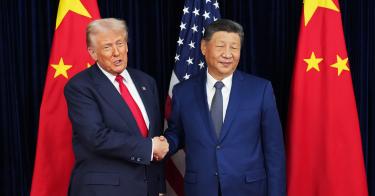As Chinese Communist Party leader Xi Jinping prepares to meet again with President Trump in the coming months, the CCP is reportedly pushing the United States to officially oppose Taiwan’s independence. Doing so would cause a major disruption in the delicate, 46-year-old U.S. policy that has helped prevent war over Taiwan.
The CCP is doubtlessly trying to make this concession part of a U.S.-China deal—a quid pro quo for trade concessions—and deceptively framing it as a cost-free opportunity to reduce risk for the U.S. In reality, “opposing” Taiwan’s independence would be destabilizing. If anything, it would increase the likelihood that Communist China uses force against Taiwan.
The CCP has never governed Taiwan, but it claims to rule the de facto democratic country. It has deliberately caused historically unprecedented military crises in the Taiwan Strait over the last few years, including launching ballistic missiles over Taiwan. The United States has never recognized China’s claims nor recognized Taiwan as a sovereign state. The U.S. considers Taiwan’s status to be “unsettled” and has historically opposed unilateral changes to China and Taiwan’s relationship from either side. But Washington has refrained from officially opposing or supporting Taiwan’s independence, in favor of an agnostic stance.
>>> The Threat of Chinese Investment in the Americas
Asking the United States to shift its diplomatic position to “oppose” Taiwan independence deceptively implies that Taiwan is preparing to declare independence or is otherwise changing the status quo in the Taiwan Strait. This is false. China is escalating its belligerence in the Taiwan Strait while most of Taiwan’s citizens oppose changing Taiwan’s status with respect to Communist China.
None of Taiwan’s sitting political parties support declaring independence, nor does the current presidential administration of Lai Ching-Te. In fact, doing so is legally “unrealistic” because it would require major changes to Taiwan’s constitution that are not politically feasible.
The request that the U.S. join the CCP’s gaslighting and oppose Taiwan’s independence makes sense only for the CCP. A U.S. statement validating this fabricated concern would help Beijing frame Taiwan as the aggressor seeking to change the status quo. That, in turn, would help the CCP legitimize its militarism and paint its own belligerence as a response to Taiwan’s alleged recklessness.
Extracting such a major U.S. policy shift would give CCP military planners cause to doubt American resolve to aid Taiwan’s defense. It would be perceived by Taiwan and America’s regional allies as a major U.S. retreat. It would also likely reduce the willingness of other nations in the Indo-Pacific to oppose Chinese territorial aggression. The net effect would be to undermine deterrence and further enable the CCP’s belligerence.
Above all, such a major concession would degrade Taiwan’s confidence in U.S. support and undermine its will to fight. This would advance the CCP objective of coercing Taiwan into simply surrendering and accepting Communist domination—the CCP’s preferred means of conquering Taiwan.
>>> Countering China at Sea: Inside America’s Cook Islands Play
Ultimately, Beijing’s false narrative about Taiwan independence is a form of cognitive warfare—an effort to manipulate the actions of the U.S., Taiwan and our allies and partners by distorting reality and “degrading rationality.”
This is a familiar tactic from the CCP. To keep fentanyl flowing into the United States, the CCP argues that it is a U.S. demand problem and withholds law enforcement cooperation, while continuing to supply precursor chemicals. To slow down U.S. reindustrialization, the CCP accuses the U.S. of “strangling” China’s economy, while China itself decouples from U.S. technology and blackmails the Trump administration with a rare earths blockade. To deter the U.S. from imposing consequences on its malign actions, the CCP complains about an overly expansive U.S. view of national security, even as it perfects and exports a totalitarian police state.
The U.S. government must see these cognitive warfare campaigns for what they are. Their goal is to win concessions for the CCP, degrade American society, keep the U.S. reliant on China, and convince the U.S. to accede to CCP hegemony in the Indo-Pacific.
Convincing the U.S. to “oppose” a fictional move toward Taiwan’s independence would be a major success for the CCP in this effort. Denying the CCP this victory would be in the national interest of the United States and would reduce the risks of conflict in the Taiwan Strait.
This piece originally appeared in The Washington Times



